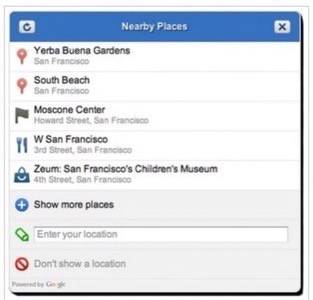Google has begun opening up access to a new Application Programming Interface (API) called the Places API. Developers building apps that include a “check in at this place” feature can use the Places API to search across all the places users might check in for basic information like business name, address, phone number and other descriptive information. That information will be editable by the businesses listed and no caching of data is allowed, so apps will have to ping Places regularly for real-time data.

Making this data as free and easy to use as Google Maps is today could create a foundation for new location-savvy apps to bloom throughout the mobile web, with far less overhead than such apps have to wrestle with today in order to provide a rich user experience. One catch? All these apps will have to be integrated with Google’s Adsense.
Also available: rating information from the same business review sites that appear in Google Maps search results. So show me the best-rated coffee shop within a mile of me that’s described as dog-friendly in user reviews. That would be awesome.
How it Might Be Used
When Google first began discussing the Places API in April, we discussed as an example a pizza restaurant that edited its delivery area on Google and then made that information available to apps that pinged the API for information.

Those kinds of examples are less likely to be implemented at first, since the first developers being allowed access to the API are people building check-in apps. But the possibilities beyond checking in are many and diverse.
Just as Google Maps made it easy for any developer to add a map and display location, the Places API could make it easy for any developer to search up to date information about any location for their application. At least that’s what seems to be possible. The Terms of Service favoring search and prohibiting caching may prove frustratingly prohibitive.
That data may be free, but it will come at the expense of integrating with Google’s Adsense platform. “Note that in order to be issued credentials for this service,” the API documentation reads, “you must provide a valid Adsense publisher id that matches the Google account with which you are currently logged in.” That’s pretty smart of Google and maybe a little nefarious, but someone’s got to pay the bills.
Why is Location so Hot?
Why is location becoming such a hot commodity? From one perspective, the proliferation of smartphones and the development of easy-to-use, compelling applications like Foursquare and MyTown are making it easier than ever for consumers to publish and leverage information about their location. Consumers want to do that for a variety of reasons, from recording their travel history to letting family know where they are to bragging about the hip places they hang out.
For developers, location data is a whole new world to pivot on when looking at feeds of user activity data. Our online activity has to date gone on in the placeless ether. Applications could offer features, highlight content or make recommendations based on things like our interests and social connections – but now any of that and more can be sorted by location. That’s a very potent column to add to any spreadsheet, too. We’re just beginning to see what all the recombinations of these types of data can look like.
It’s an exciting new location-based world, and much of it may be powered by the Google Places API.

















